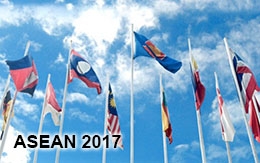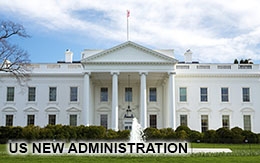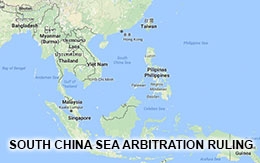Search result for "ruling"
-
Implications of the July 2016 Arbitral Tribunal Ruling
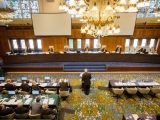 Category: South China Sea arbitration rulingFor a considerable time now efforts to manage disputes and promote cooperation in the South China Sea have been inhibited by the lack of an equitably defined geography of disputed and non-disputed maritime zones in the South China Sea. The Award rendered by the Tribunal on 12 July 2016 in the so-called South China Sea arbitration initiated by the Philippines against China has put an end to that situation, thus opening up new cooperation opportunities for states in the region.
Category: South China Sea arbitration rulingFor a considerable time now efforts to manage disputes and promote cooperation in the South China Sea have been inhibited by the lack of an equitably defined geography of disputed and non-disputed maritime zones in the South China Sea. The Award rendered by the Tribunal on 12 July 2016 in the so-called South China Sea arbitration initiated by the Philippines against China has put an end to that situation, thus opening up new cooperation opportunities for states in the region. -
The South China Sea Arbitration: No, It’s Not a PCA Ruling
 Category: South China Sea arbitration rulingOn July 12, 2016, an award in the arbitration case between the Philippines and China over the South China Sea was announced, which denied China’s “historic rights” in the South China Sea. As the award was released by the Permanent Court of Arbitration (PCA) in The Hague, the media reported that the PCA “ruled” the case, describing the award as a “PCA ruling.”
Category: South China Sea arbitration rulingOn July 12, 2016, an award in the arbitration case between the Philippines and China over the South China Sea was announced, which denied China’s “historic rights” in the South China Sea. As the award was released by the Permanent Court of Arbitration (PCA) in The Hague, the media reported that the PCA “ruled” the case, describing the award as a “PCA ruling.” -
Storm clouds gather over South China Sea ahead of key U.N. ruling
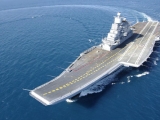 Category: PoliticsSigns that China may be contemplating another bout of island-building in the South China Sea ahead of an important U.N. ruling on the issue have provoked the United States to step up its vigilance in the region in recent days.
Category: PoliticsSigns that China may be contemplating another bout of island-building in the South China Sea ahead of an important U.N. ruling on the issue have provoked the United States to step up its vigilance in the region in recent days. -
After the South China Sea Ruling
 Category: PoliticsThe long-awaited Tribunal’s merits ruling will come soon. What happens then? In Part 1, I examined Chinese legal opinions regarding the Philippines-initiated arbitration case against China’s expansive nine-dash line (NDL) claim in the South China Sea (SCS). In short, the intent of Beijing’s legal position paper on the Philippine case at the International Tribunal of the Permanent Court of Arbitration (PCA) in was to ensure the Tribunal judges ask the “right” (meaning “favorable”) questions in their deliberations. Beijing’s goal was to indirectly challenge the merits of the case without formally doing so — which would imply acknowledgment of the PCA’s jurisdiction.
Category: PoliticsThe long-awaited Tribunal’s merits ruling will come soon. What happens then? In Part 1, I examined Chinese legal opinions regarding the Philippines-initiated arbitration case against China’s expansive nine-dash line (NDL) claim in the South China Sea (SCS). In short, the intent of Beijing’s legal position paper on the Philippine case at the International Tribunal of the Permanent Court of Arbitration (PCA) in was to ensure the Tribunal judges ask the “right” (meaning “favorable”) questions in their deliberations. Beijing’s goal was to indirectly challenge the merits of the case without formally doing so — which would imply acknowledgment of the PCA’s jurisdiction. -
The South China Sea after the Arbitral Tribunal
 Category: PoliticsThe Arbitral Tribunal’s ruling has changed the situation in the South China Sea in unexpected ways.
Category: PoliticsThe Arbitral Tribunal’s ruling has changed the situation in the South China Sea in unexpected ways. -
Middle Powers and the South China Sea: Time to Step Up, or Step Out?
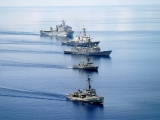 Category: Working PapersThe decision in July 2016 by a special tribunal of the Permanent Court of Arbitration to dismiss the legitimacy of China’s expansive territorial claims in the South China Sea has raised significant questions about how this issue should be managed in the future. Some have argued that the ruling presents an opportunity for regional states to reset interactions with Beijing by emphasising cooperation over sovereignty claims, while others have underscored its importance as a lever to push back further against Chinese territorial claims in maritime Asia.
Category: Working PapersThe decision in July 2016 by a special tribunal of the Permanent Court of Arbitration to dismiss the legitimacy of China’s expansive territorial claims in the South China Sea has raised significant questions about how this issue should be managed in the future. Some have argued that the ruling presents an opportunity for regional states to reset interactions with Beijing by emphasising cooperation over sovereignty claims, while others have underscored its importance as a lever to push back further against Chinese territorial claims in maritime Asia. -
De-combatising the Spratly Disputes
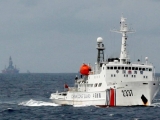 Category: Working PapersThe possibility of standoffs among the Spratly disputants and especially between China and the US may have increased with the ruling of the Arbitral Tribunal on 12 July 2016. The award has invalidated Beijing’s basis for Spratly patrols based on the nine-dotted line. At the same time it lends America new ground for Freedom of Navigation Operations (FONOPs) in the South China Sea (SCS). These are part of the reason for Beijing to reject the arbitration award.
Category: Working PapersThe possibility of standoffs among the Spratly disputants and especially between China and the US may have increased with the ruling of the Arbitral Tribunal on 12 July 2016. The award has invalidated Beijing’s basis for Spratly patrols based on the nine-dotted line. At the same time it lends America new ground for Freedom of Navigation Operations (FONOPs) in the South China Sea (SCS). These are part of the reason for Beijing to reject the arbitration award. -
International Law and the South China Sea
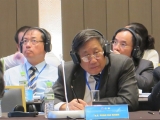 Category: VideosThis session assesses the utility of international law in managing and resolving the South China Sea disputes in the post-award context of the Philippines-China arbitration case at the Arbitration Tribunal set up under Annex VII of the UNCLOS. Arguably the long-awaited award that has surprised most, if not all, international observers has also changed the legal status quo in the South China Sea. What are the implications of the arbitration award for the South China Sea situation going forward? How might the Tribunal’s assessment of evidence, reasoning and conclusion in the Philippines-China case affect the claims of the parties directly involved ...
Category: VideosThis session assesses the utility of international law in managing and resolving the South China Sea disputes in the post-award context of the Philippines-China arbitration case at the Arbitration Tribunal set up under Annex VII of the UNCLOS. Arguably the long-awaited award that has surprised most, if not all, international observers has also changed the legal status quo in the South China Sea. What are the implications of the arbitration award for the South China Sea situation going forward? How might the Tribunal’s assessment of evidence, reasoning and conclusion in the Philippines-China case affect the claims of the parties directly involved ... -
Legal and Geographical Implications of the South China Sea Arbitration
Category: International LawIntroduction On 12 July 2016 the Arbitral Tribunal in in the case between the Philippines and China delivered its Award, following its earlier 29 October 2015 Award on Jurisdiction and Admissibility.[1] The Tribunal was constituted under Annex VII of the United Nations Convention on the Law of the Sea (LOSC),[2] having been initiated by the Philippines.[3] The Permanent Court of Arbitration in The Hague acted as the registry for the case and venue for hearings.[4] China, for its part, returned the Philippines’ notification of its claims, argued that the Tribunal lacked jurisdiction to hear the case, and has rejected the Tribunal’s Award.[5] The ...
© 2016 Maritime Issues


